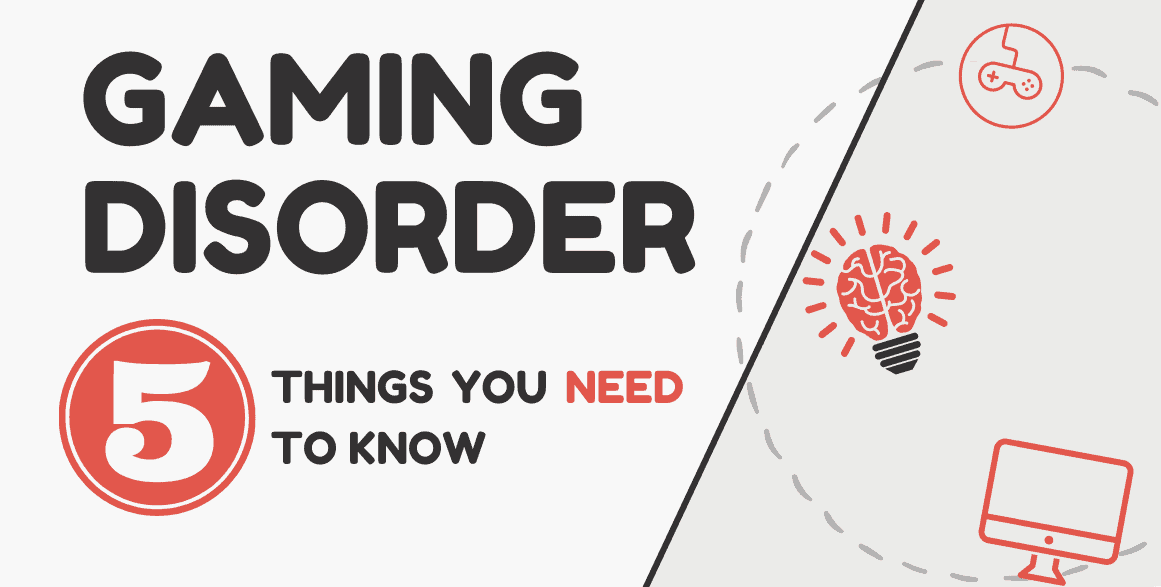
Gaming Disorder: 5 Things You Need to Know
Once Gaming Disorder was classified as a real disease by the World Health Organization in 2019, people all around the world were quick to both support and criticize the decision. While this has been great for building awareness, it also results in a lot of misinformation surrounding video game addiction to be spread online.
The official definition for Gaming Disorder is:
a pattern of gaming behavior (“digital-gaming” or “video-gaming”) characterized by impaired control over gaming, increasing priority given to gaming over other activities to the extent that gaming takes precedence over other interests and daily activities, and continuation or escalation of gaming despite the occurrence of negative consequences
Or, more simply, you might have a problem if you start to prioritize gaming over your everyday responsibilities.
Not sure if you’re addicted to gaming? Take the test:
Millions of People Are Addicted to Gaming
Pretty shocking, right? Before I did the research I honestly didn’t expect it to be so high. You might even think it’s a little too high. After all, only 3-4% of gamers suffer from an addiction. However, when you realise that there are 2 and a half BILLION gamers in the world, the number starts to make more sense.
Symptoms will differ in severity dramatically from person to person, and for some people, the problem will be minor. One person may struggle with going to bed late and eating healthy because they can’t stop gaming. Another might be neglecting their children in order to play games for 16 hours a day, never leaving the house.
However, this doesn’t mean one person’s illness should outweigh another.
A lot of people, especially hardcore gamers, are quick to dismiss someone suffering from gaming disorder as having a trivial, or non-existent, problem. It’s not as simple as just turning off the computer. Gaming addicts go through withdrawal symptoms similar to people in recovery for alcohol or drug addiction. Shaking, nausea, tiredness, anxiety, and headaches are all common problems when people try to quit gaming.
As a result, people should be able to get the treatment they need regardless of their situation, As awareness of gaming disorder increases, hopefully, we can reduce the stigma surrounding video game addiction to match.

Men Are More Likely to Suffer from Gaming Disorder
What do you think the average gamer looks like? A man in his early 20’s, perhaps a college student? Wrong. It’s actually a woman in her mid 30’s.
Now, I’ll be honest. This might come from the former gamer inside me, but I find it difficult to classify someone that plays 30 minutes of Candy Crush every day as a gamer. But, that’s what the research says, so we’re going to stick with it.
However, while genders in gaming sit at around 50/50, the numbers change dramatically when we look at gaming addiction. According to our figures, over 90% of the people seeking help for gaming disorder are men.
Why is this the case?
A lot of research has been done into the differences between males and females in the world of addiction, but only relatively recently have studies been done on internet gaming disorder.
One study carried out in 2018 by Dong et al discovered that men who play video games experience higher levels of brain activity in the medial frontal gyrus and bilateral middle temporal gyri. This resulted in a higher likelihood to experience cravings for gaming, even after only 30 minutes of playing. 1 1. Gender-related differences in neural responses to gaming cues before and after gaming: implications for gender-specific vulnerabilities to Internet gaming disorder ×
The researchers measured brain activations using fMRI scanning before, during, and after gaming. The subjects also took part in a cue-craving task before and after gaming. These results suggest neural mechanisms for why males may be more vulnerable than females in developing gaming disorder.
Another point to consider is the natural competitiveness of males compared to females, combined with the ability to dedicate 100% focus on the task at hand without getting bored.
In my 20+ years of gaming, I’ve never known a woman that had spent more than 60 hours a week playing video games – week-in, week-out. However, I know a load of guys – including myself – that have done this regularly.
It’s not the case with every man or woman, obviously, I can only speak from experience. But the innate desire to beat other people, to improve, and to challenge ourselves constantly is something I’ve seen repeated time and time again in my male gamer friends.
College Students at Greater Risk of Video Game Addiction
Let me know if this sounds familiar to you.
I started gaming at around 4 or 5, but gaming was never a problem. Throughout my childhood I lived an active life, I had good friends, and I thought of video games as a treat. Once I got to high school, I started to play more, especially online games.
School wasn’t particularly difficult, and as a result, I could get away with doing assignments late and spending more time playing video games. However, once I got into college I no longer had my parents or teachers holding me accountable.
Soon after starting college I became overwhelmed and started using video games as an escape from my problems. I showed signs of depression, I wasn’t sleeping properly, and my diet and gone downhill. It wasn’t long until I would spend the majority of my time gaming in order to get away from my responsibilities.
For a large portion of people in the Game Quitters community, video games were never a problem until university. Sure, the symptoms might start in school. For example, I would spend most of my time at home playing video games. But, because I was still living with my parents I was eating well, I was sleeping okay, and I still saw my friends every day at school.
However, as I mentioned before, once you get to college all of a sudden you’re alone. No one’s breathing down your back to get your work done. No one is coming to save you.
A lot of people aren’t used to this level of difficulty, and so they fall back to what’s comfortable. The one thing that has always been there when they needed it. This is, of course, gaming.
Which, if left unchecked, will inevitably lead to further problems and even result in developing an addiction to gaming.
When we play video games we’re in total control. Nothing can go wrong, and even though we can lose progress, it’s impossible for us to fail. You’ll never actually suffer real-world consequences if you experience a setback in a video game. So, when things become too much in your real life, your brain wants you to get back to the virtual world where it feels safe.
Your brain is actually affected a lot more than you might realise by gaming. Even a small amount of gameplay can cause issues, and not many people really understand this.
Want to know more about gaming’s effect on your brain? Keep reading to find out.
Video Games Are Addictive By Design
Surprisingly, it’s in the industry’s best interests to make as much money as they can.
How do they do that? By making their games as addictive as possible. Or, in their words, “fun and engaging”.
You might think all they need to do is make a great game and the money will follow. If only it were so simple.
In actuality, many companies are utilizing the help of psychologists and addiction experts in order to keep you hooked on their game for as long as possible. They’re implementing game mechanics based on scientific research into addictive behaviours, and doing whatever they can to disguise them as “revolutionary” new features.
Want to know more? Watch the video below to find out, and check out our article on how games are designed to be addictive.
Also, if you’re interested in which video games are more addictive than others, read through our list of the 9 most addicting games in the world to see why some games are more likely to keep you playing than others.
How Gaming Affects Your Brain Chemistry
Have you ever tried to learn a new hobby? Whether you’re currently a gamer, or have recently quit playing, you’ll understand just how difficult it can be.
You start off full of excitement and motivation to improve. You think about all of the things that you can accomplish through this activity, and you love every hour you pour into it.
However, after what might be a day, a week, or a month, you start to lose interest. You don’t really feel in the mood for it or you’d rather be doing something else. Eventually, after missing out on one too many practice sessions, you take part in the hobby for the last time.
What follows is usually a feeling of being disheartened by life. Perhaps you feel like you’re not talented enough to do what you wanted. You feel like a failure.
If you’re a former gamer this will likely result in you experiencing cravings for video games.
But why does this happen? In the past, you found it so easy to take up new hobbies. You didn’t have a problem practising an instrument every day when you were young. So, what changed?
The answer: video games.
You see, humans have a fundamental set of needs that have to be fulfilled. As it so happens, video games are incredibly good at satisfying these needs.
They allow you to experience growth, escape, challenge, competition, and social activity on a level that you can’t find anywhere else. To add to this, if you’re playing games, you’re also becoming accustomed to getting rewards with minimum investment.
When you can pick up a game and be proficient in a matter of minutes or hours, your brain expects the same thing to happen with new skills.
You might think that’s ridiculous. No one can pick up a guitar and master it in a week. But that’s not what your brain thinks.
The only thing your brain is focused on is survival and pleasure with as little effort as possible. It’s always going to choose the path of least resistance.
What do you think your brain will find more enjoyable? Spending 10 hours playing the guitar to learn one song, or beating an entire game’s campaign?
Of course, it’s going to choose to game.
You’ve become so accustomed to the level of stimulation that gaming provides, that when you try to do anything else you’re going to get pulled back to the easiest and most comfortable form of pleasure.
This is why extended periods of gaming for years is so problematic. You’re dissatisfied with your life so you decide to change. However, once you try to do something different, your brain does everything it can to take you back to video games.
It’s a vicious cycle that’s incredibly hard to escape from. But, it can be done.
How to Treat Gaming Disorder
It’s important to remember that no matter what you’re going through, you’re not alone. Millions of people are affected by Gaming Disorder, and more and more of them are coming forward to get the help that they need.
Game Quitters is an online community with videos, a forum, and a wealth of information available for free in our articles.
If you’re looking for something more professional, take a look at our video game addiction therapist directory.
Want some inspiration on what’s possible if you decide to quit gaming? Read through some of our community stories and you’ll soon feel like anything is possible.
Even if you don’t want to quit gaming, you never know how your life might change if you take some time to escape the virtual world.
Interested? Take 90 days off gaming now, and change your life for the better.
